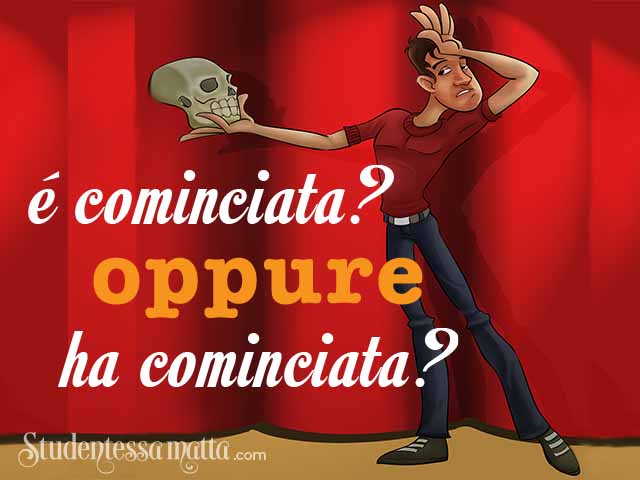
In italiano ci sono verbi transitivi e intransitivi. E poi ci sono alcuni verbi che possono essere entrambi transitivi o intransitivi.
In Italian, there are transitive and intransitive verbs.
And then, some verbs can be both transitive and intransitive.
Per esempio il verbo COMINCIARE.
Take for example, the verb COMINCIARE.

Ieri la festa è cominciata tardi.
Yesterday the party began late.
Abbiamo cominciato la festa tardi.
We began the party late.
È cominciato a piovere.
It began to rain.
La piove ha cominciato a bagnarmi.
The rain began to soak me.
Che confusione!
What confusion.
Non preccuparti. Chiariamo subito la questione facendo una rapida rassegna di cosa sono i verbi TRANSITIVO e INTRANSITIVO italiani.
Don’t worry. Let’s clear this up right now by quickly reviewing what TRANSITIVE and INTRANSTIVE Italian verbs are.
VERBO TRANSITIVO
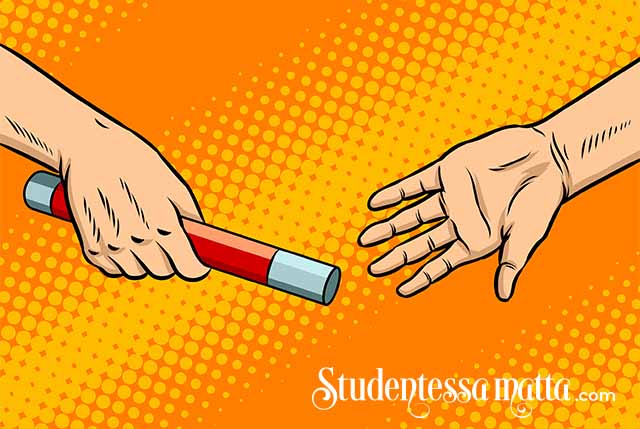
Il VERBO TRANSITIVO trasferire un’azione da una cosa all’altra. Questi verbi richiedono il complemento oggetto (oggetto diretto) che risponde alla domanda: Chi? Che cosa? I verbi transitivi non richiedono una preposizione come “A”, “SU,” ecc.
TRANSITIVE VERBS transfer an action from one thing to another. These verbs require a direct object that answers the question: Who? What? Transitive verbs do not require prepositions such as “at,” “to,” etc.
Transitivo:
Maria scorre (che cosa?) la rubrica telefonica (oggetto).
Maria scrolls (what?) the phone book (object).
Sofia fotografa (che cosa?) le bambine.
Sofia takes a picture (of what) of the girls.
Francesca prepara (che cosa?) la pizza.
Francesca makes (what?) the pizza.
Passato dei verbi Transitivi
Past Tense TRANSITIVE Verbs
take the ausiliare AVERE.
I verbi transitivi al passato prendono l’ausiliare AVERE.
Transitivi verbi si usa “AVERE” nel tempo passato. I verbi transitive hanno un ricevitore dell’azione.
Transitive verbs use “the verb AVERE—to have” in the past tense. Transitive verbs have an action receiver.

Ho finito di guardare (che cosa?) lo spettacolo verso le nove.
I finished watching (what?) the show around nine.
Franco ha corso (che cosa?) una maratona.
Franco ran (what?) a marathon.
Maria ha cambiato (che cosa?) il suo vestito.
Maria changed (what?) her dress.
VERBO INTRANSITIVO
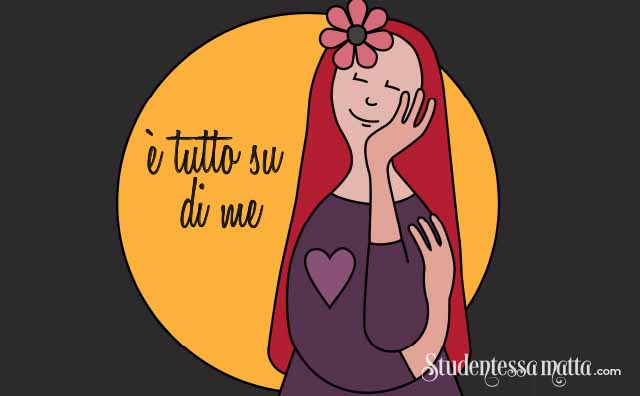
Il VERBO INTRANSITIVO esprime uno stato o una condizione. Il verbo intransitivo NON vuole il complemento oggetto (oggetto diretto). L’azione non passa direttamente dal soggetto all’oggetto. Verbi intransitivi hanno bisogno di altri complimenti che rispondono a domande come: Di chi? Con chi? Dove? e richiedono una preposizione (a, su) per connettersi e finire l’idea.
INTRANSITIVE VERBS express a state or condition. The intransitive verb does NOT require a direct object. The action does not pass directly from the subject to the object. Intransitive verbs answer questions: to where, from where to who,
Intransitivo:
Il fiume Po scorre (dove?) nella Pianura Padana. (di luogo)
The Po river flows (where?) in the Paduan plain (place).
Paola è felice.
Paola is happy
Alberto corre lentamente.
Alberto runs slowly.
Past Tense INTRANSITIVE Verbs
take the ausiliare ESSERE.
I verbi intransitivi al passato prendono l’ausiliare ESSERE.
Intransitivi verbs si usa “essere” nel tempo passato. I verbi intransitive non hanno un ricevitore dell’azione. Esprimere uno stato o una condizione o richiedono una preposizione.
Intransitive verbs used “the verb ESSERE—to be” in the past tense. Intransitive verbs do not have an action receiver. They express a state or condition or require a preposition to finish the phrase.

Il marziano è partito. Il marziano è partito (dove?) per il pianeta Nettuno.
The martian left. The martian took off (to where?) to the planet Neptune.
Sono salita (dove?) sull’autobus.
I got on (where?) the autobus.
Lo spettacolo è finito (a che ora?) verso mezzanotte.
The show finished (at what time?) around midnight.
Il tempo è cambiato (da che cosa?) drasticamente.
The weather changed (from what condition?) drastically.
Verbi frequenti che hanno sia l’ausiliare ESSERE che AVERE
Common Verbs taking either auxiliary AVERE or ESSERE
salire (to climb up)
scendere (to climb down)
cominciare/iniziare (to begin)
continuare (to continue)
finire /terminare (to end)
seguire (to chease)
vivere (to live)
invecchiare (to age)
migliorare (to improve)
peggiorare (to worsen)
cambiare (to change)
crescere (to grow)
girare (to turn)
passare/trascorrere (to pass)
guarire (to cure/get better)
correre (to run)
saltare (to jump)
volare (to fly)
durare (to last)
cuocere (to cook)
Ho cominciato a leggere il libro. / È cominciato a piovere.
Ho corso una gara. / Sono corso al parco.
Un po’ di pratica!
Now for some practice!
Esercizi per te. Riempiere lo spazio vuoto con il verbo ausiliare “essere” o “avere”.
Exercises for you. Fill in the blank with the auxiliary verb “essere—to be” or “avere—to have.” If you’d like the answers email me a:t Melissa@StudentessaMatta.com
Il mio corso di Italiano _______ cominciato ieri.
My Italian course started yesterday.
Quella donna_____ corso molte marato.
That woman has run many marathons.
La primavera ________ finita bruscamente… adesso sembra la metà dell’estate. Spring ended abruptly… now it seems the middle of the summer.
Francesca _______ corsa in lavanderia, ma era chiusa perché è sabato.
Francesca ran to the dry cleaners, but it was closed because it was Saturday.
________ cominciato il libro la scorsa settimana.
They began the book last week.
Marco ________ finito i compiti?
Did Marco finish his homework?
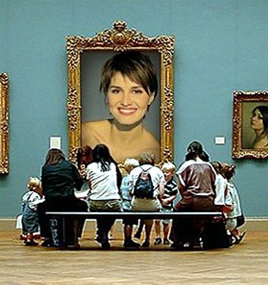

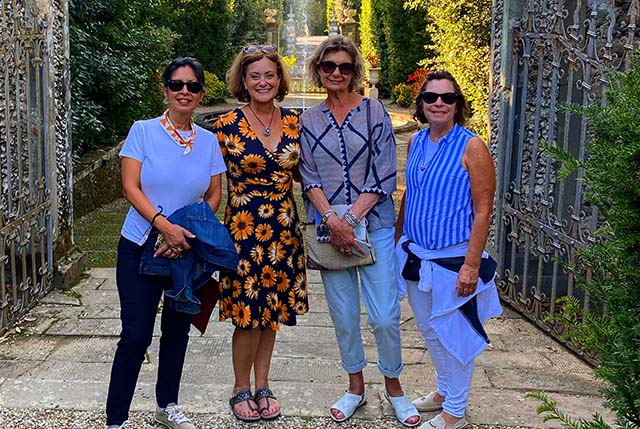

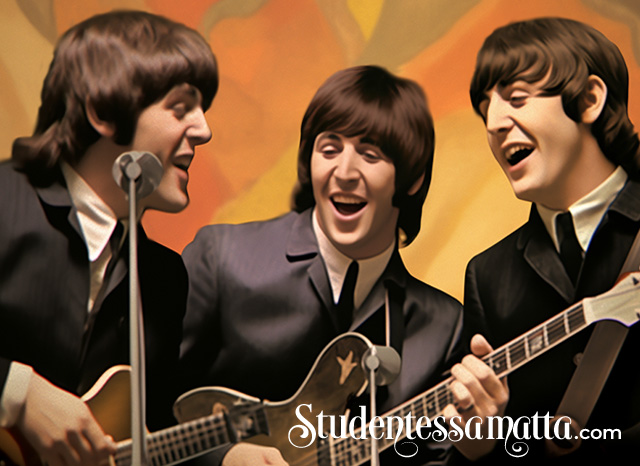
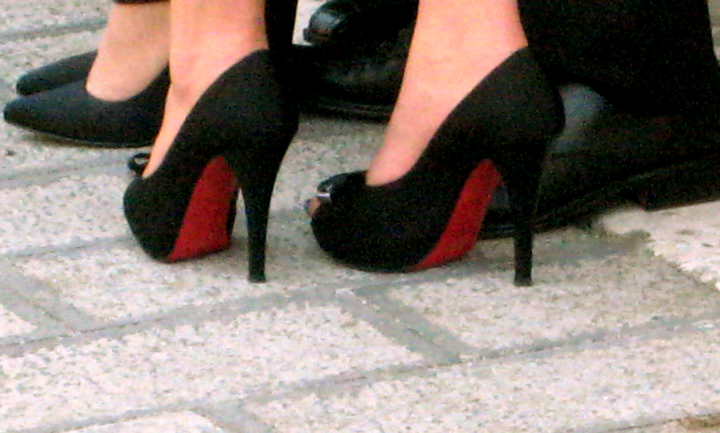






Ciao Mélissa, le spiegazione sul due verbi sono ottimi….
Grazie di cuore, a la prossima lezione, 🙏💐
Cari saluti,
Veronika